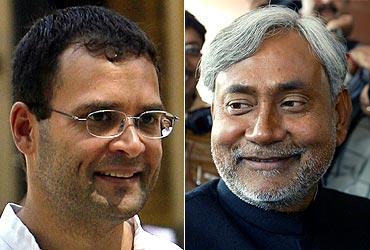
There is evidence that the United Progressive Alliance II, under Manmohan Singh's leadership, is winding down even though it has not crossed its halfway mark yet.
The first piece of evidence is that the reform process is grinding to a near halt at a time when further reform is needed the most.
Brave efforts are being made to rejuvenate the process but the underlying politics, the electoral arithmetic (earlier it was the Dravida Munnetra Kazhagam's demands and now it is the Trinamool Congress) and ethos (state units of the Bharatiya Janata Party want Parliament held up for this reason or that) in Parliament offer little hope.
...
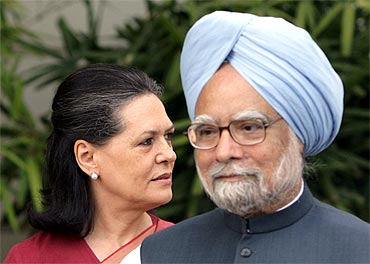
The second piece of evidence is that the electorate thinks the winding-down is happening.
A cross-country opinion poll carried out by the Centre for the Study of Developing Societies for several media organisations finds that Manmohan Singh's popularity as the next prime minister has dwindled sharply after peaking in 2009 when UPA returned to power.
It happened with Sonia Gandhi too. Her popularity as a potential prime minister peaked in 2004 but dwindled thereafter when she declined the post.
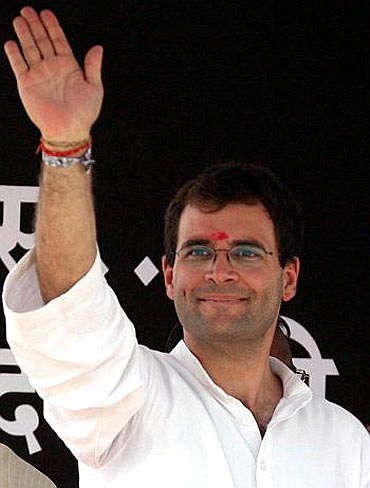
The combined percentage points lost by the two have been precisely garnered by Rahul Gandhi, enabling him to top the chart.
The hypothesis is that when the electorate realises that a person is no longer a potential candidate, by desire or default, it moves to the next likely candidate. The opinion poll is to be taken seriously because it summarises data for earlier periods so that there is a sense of continuity that lends itself to interpretation.
And the sample is quite large and diverse, covering town and country, women and Dalits, in the ratio in which they make up India's population.
If UPA-II is over bar valiant attempts at resuscitation, what has it done or not done and what clues does this offer to what can follow? Going by the opinion poll, it has done quite well. Even now after all the setbacks, the electorate, in a mock poll conducted with the opinion poll, gives UPA 38 per cent of the popular vote -- that is 1.6 percentage points more than what it polled in 2009 and 12 percentage points ahead of the National Democratic Alliance.
This is not surprising, going by the detailed answers to questions. Remarkably, a substantially larger number feels that households have become economically better off during 2004-11.
A clear majority, in the ratio of 2:1, is satisfied with its financial condition, though dissatisfaction is highest among the poor.
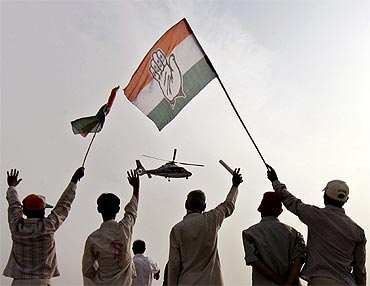
There is less optimism about the future than earlier but the total of those who think things will get better or remain the same (that is not get worse) is a phenomenal 73 per cent.
There is greater pessimism among the poor but still more among the poor are optimistic than pessimistic. Most feel the price situation under UPA (between 2006 and now) is the same but a vast majority feels the government has not done enough to check prices and a majority holds the Centre responsible for this.
The view on the condition of farmers is instructive. More (44 per cent versus 35) feel they are the same or better off. It is the middle farmer, not the small farmer or the agricultural labourer, who is ambivalent about his condition.
The overriding picture is that there is no discernible feeling of distress and the very poor in the countryside are better off (employment guarantee?) while the middle farmer has suffered (poor farm gate prices?).
More people feel that UPA-I was better but an equal number would give UPA-II another chance. Thus, UPA is down but not out.
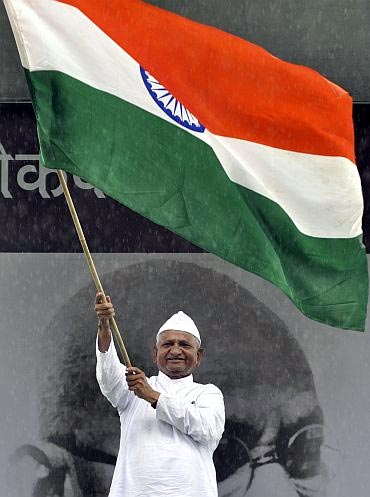
But then, why the feeling that the party is over? A good 60 per cent feel the UPA government is corrupt (very corrupt and somewhat corrupt), it is insincere in responding to the anti-corruption movement and wants to protect those who have black money in foreign banks.
The electorate is clear-headed about Baba Ramdev and Anna Hazare. The former is better known but the latter is more trustworthy.
At the heart of the mood change is the perception about Manmohan Singh and corruption. Only a fourth of the respondents say he has tried his best to control corruption and nearly a third say he may be honest himself but has done nothing to control corruption.
But, ironically, BJP is unable to make much capital out of the corruption issue. B S Yeddyurappa, Karnataka's chief minister, when the poll was conducted who had to resign thereafter, turned in a very poor performance.
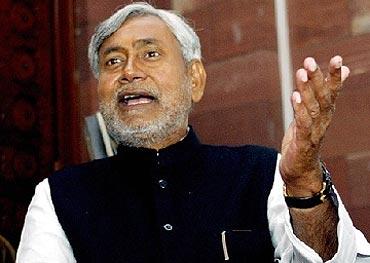
If Rahul Gandhi is up is he all but in? No. His personal popularity is still way below (precisely half) Atal Bihari Vajpayee's in 2004.
A look at state governments and chief ministers' performance in the polls throws up two hypotheses. Mayawati and her government in Uttar Pradesh have fared very poorly.
So the Congress and a possible UPA-III can get crucial additional support in Uttar Pradesh, thus giving it a better working arithmetic.
But perhaps the most alluring possibility is thrown up by Nitish Kumar scoring the highest in popularity among all chief ministers.
NDA is made up of BJP plus allies but Nitish Kumar is backed in Bihar by an alliance of NDA plus minorities with the Hindutva elements kept on a tight leash.
Such an alliance, with a leader like Vajpayee with a liberal image at its head, can have far greater national as well as arithmetical support in Parliament than UPA.
Besides, Nitish Kumar is as much for reforms as anybody else and does not have the leftist baggage on which UPA had to rely at one stage.